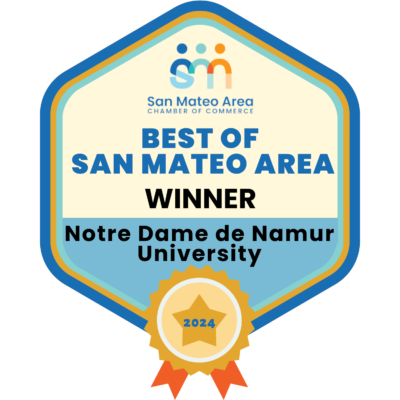
MBA vs Master’s Degree: Which Is Right for You?
December 10th, 2024
MBA vs. Master’s Degree: Which Is Right for You?
According to a 2023 report from the U.S. Census Bureau, about 38% of Americans age 25 and older have at least a four-year degree. However, for many students, seeking higher education doesn’t stop at a bachelor’s.
After earning their four-year degrees, many individuals pursue a graduate degree. For students seeking high-level management and leadership roles, one of the most popular options is a Master of Business Administration (MBA).
However, professionals seeking career advancement in the business world and beyond have other options to choose from as well. Different types of graduate degrees have advantages for different types of professionals. To help those who are evaluating an MBA vs. a master’s degree, here’s some information about the curriculum, specialization options, and career opportunities for both types of degrees.
What Is an MBA?
As the name suggests, a Master of Business Administration is a graduate degree that focuses primarily on the knowledge and skills needed to run a business. While it’s a popular choice for students who majored in business at the bachelor’s level, students who have studied psychology, English, and other disciplines also take this path.
Earning an MBA can be a great way for professionals in any industry to prepare for promotions and high-level administrative positions.
Curriculum
The majority of classes offered through an MBA program focus on organizational leadership. While the curriculum can vary among schools, all MBA students typically take classes that cover a set of essential business administration skills.
The core curriculum of an MBA program is often made up of classes on:
- Management and organizational theory
- Legal and ethical business practices
- Data analysis
- Management accounting
- Corporate financial management
- Technology implementation
- Strategic decision-making
- Micro- and macroeconomics
Additionally, many MBA programs allow students to take electives on more specialized topics. For example, a student interested in leading marketing initiatives might take classes on managing consumer information extracted from social media platforms. A student who wants to advance in the financial sector might take classes on risk analysis.
Types of MBA Programs
While an MBA is a specific type of master’s degree, MBA programs themselves come in a few different variations. Each one is designed for students with different career goals and/or with different levels of professional experience.
Finance
Finance MBAs focus heavily on the financial aspects of running a business. As such, they’re exceptionally popular with students who work or want to work at banks, investment firms, financial consulting firms, and similar institutions. However, a finance MBA can also be helpful for insurance and business development professionals.
Accounting
While accounting MBA programs are closely related to finance MBAs, the major difference is that finance is generally focused on managing assets and growth planning. Accounting is more focused on managing an organization’s day-to-day internal financial processes.
MBA students in accounting programs often take classes on:
- Budget analysis
- Accounting system software
- Financial reporting
- Risk, fraud, and security assessment
- Generally accepted accounting principles
- Auditing
With an MBA in accounting, professionals can take on accounting roles in just about any kind of organization. But along with taking care of day-to-day processes, high-level accountants with MBAs often help their organizations analyze their finances, set organizational policies regarding spending, and stay compliant with all relevant laws.
Global
Global MBA programs focus on international business management. They are similar to general MBA programs but emphasize international dynamics, laws, and business practices.
Like students in traditional MBA programs, global MBA students take classes on topics such as finance, accounting, and organizational leadership. Additionally, they typically take classes on:
- Cross-cultural personnel management
- Global logistics planning
- International finance laws
- Marketing for international consumer bases
Global MBA programs often give their students the chance to participate in international student exchanges and similar opportunities. Many programs also allow students to study global finance, global accounting, and other specialities.
Executive
Students who already have business administration experience and are looking for opportunities to advance often enroll in executive MBA programs. These programs often include night, weekend, summer, and online classes so working students can earn their degrees without disrupting their work schedules. Managers and similar administrators often enroll in executive MBA programs to prepare for senior and executive positions.
The curriculum for executive MBA programs is usually similar to that of standard MBA programs. However, because executive MBA students have more professional experience, classes focus more on advanced concepts instead of foundational skills. For example, an accountant in an executive MBA program might not take classes on generally accepted accounting principles. Instead, they’d take classes on high-level topics such as financial risk assessment and budgetary policymaking.
Career Opportunities
The main similarity between MBAs and master’s degrees is that students seek both types of degrees to advance their careers. That being said, students who pursue MBAs are most often seeking high-level administration, management, and executive roles.
Career opportunities vary depending on which type of MBA program a student pursues, but popular positions for MBA graduates include:
- Accountant
- Marketing manager
- Logistics manager
- Business operations manager
- Budget and financial analyst
- Financial analyst
- Operations research analyst
- Business intelligence analyst
- Human resources manager
Some MBA program graduates with extensive work experience are able to move into departmental director and C-suite positions, such as chief executive officer or chief financial officer positions.
Other MBA graduates find jobs in consulting. Many companies hire a business consultant or business consulting firm to identify areas where they can improve efficiency and profitability and to oversee organizational changes. These positions are often high paying and held by people with graduate degrees.
Popularity
The MBA is the degree of choice for business administration professionals across many industries. Mostly, this is because it covers a breadth of business expertise and can lead to any of a range of types of job opportunities in nearly any industry. There are few nonspecialist fields that an MBA won’t help a professional excel in.
What Is a Master’s Degree?
Broadly speaking, the term master’s degree refers to any kind of graduate degree in any subject. For example, instead of pursuing an MBA, a person might earn a master’s in technology, marketing, or another subject related to the industry or field they want to work in. Earning a master’s in a specific subject can be a great way to prepare for high-level roles in a specific industry or a field that requires technical knowledge.
Curriculum
When it comes to comparing an MBA vs. a master’s degree, perhaps the biggest difference is in their curricula. The curricula for master’s programs can vary widely depending on the subjects. However, master’s programs tend to focus more on specific advanced technical skills rather than on the broader set of administrative skills MBA programs focus on.
For instance, Notre Dame de Namur University offers a Master of Science in Technology Management (MSTM) program to prepare students for information technology (IT) leadership roles. While the program offers some classes on topics such as managerial accounting that are found in MBA programs, it also includes classes on software development, IT security, and network systems management.
Types of Master’s Degree Programs
Master’s degree programs in different subjects are very different from each other. However, most fall into one of two categories: Master of Science or Master of Arts. Each is designed for students with different professional goals. Students can also choose to add a graduate certificate to their studies.
Master of Science
Master of Science (MS) programs tend to focus on science, technology, engineering, and math (STEM) fields. In some cases, these programs also include classes on how to manage resources and teams of other professionals as well, making them a great choice for professionals who want to go into STEM-focused industries.
Master of Arts
Master of Arts (MA) programs usually focus on topics related to social science, philosophy, academia, or the humanities. In fact, MBA programs are a type of MA program because they are rooted in organizational theory despite including classes on accounting and similar STEM subjects. Many education professionals earn a Master of Arts in School Administration to pivot into school management.
Graduate Certificate
In addition to earning a full master’s degree, many students choose to earn a graduate certificate in a specific and often related subject. For example, a professional with an MBA might decide to earn a graduate certificate in marketing to prepare for marketing leadership roles.
A graduate certificate is not equivalent to a full master’s degree. As such, in most cases, graduate certificates take less than a year to earn. The number of classes required to earn a certificate varies, but students generally take three to six classes. Students typically must have a master’s degree or be currently enrolled in a master’s program to qualify for a graduate certificate program.
Career Opportunities
Like master’s programs themselves, the career opportunities for a person with a master’s degree can vary widely. Generally, though, they can qualify for advanced technical, management, and administrative positions in their field of study.
For example, a professional with a Master of Science in Technology Management could become a network and computer systems administrator, an IT project manager, or even a chief technology officer. A professional with a Master of Arts in Marketing could qualify for equivalent positions in their department or organization.
Popularity
The U.S. Census Bureau reports that about 14% of Americans age 25 and older hold either a master’s degree, a doctorate, or a similar advanced degree as of 2022. In 2011, only about 11% held an advanced degree. While the Census Bureau doesn’t distinguish between MBAs and master’s degrees in other areas, this data indicates that more Americans than ever value the advanced skills and opportunities a master’s degree of any kind can provide.
MBA vs. Master’s Degree: Key Differences
In many ways, MBA programs and master’s degree programs are similar. They’re both graduate degree programs that are designed to prepare new and experienced professionals alike for high-level roles in their fields. However, for those assessing an MBA vs. a master’s degree, understanding a few important differences between the two can be the key to deciding which one is most suited to their career goals.
Before deciding between an MBA and another type of master’s degree, it’s important to remember the following:
- MBA programs teach a broad set of administration skills.
- Other types of master’s programs teach advanced skills specific to a given field.
- MBA programs prepare students for leadership positions in industries and departments of all kinds.
- Other types of master’s programs prepare students for advanced technical roles or leadership positions in a specific field.
With these factors in mind, students can decide whether they want to have the flexibility of being qualified for many leadership positions at a range of types of organizations or to establish themselves as authorities with a deep knowledge of one field. Careerwise, both paths have their own advantages.
MBA vs. Master’s Degree: Choosing the Right Graduate Program
After gaining a better understanding of what options are available, it’s important to take practical considerations into account when deciding on the right MBA or master’s program.Whether a student or professional is focusing on career advancement or seeking higher education for personal fulfillment, here are some factors to consider during the decision-making process.
Career Development
Career development is one of the most common reasons for someone to seek higher education. A standard four-year degree can open many doors in the professional world. However, there are some positions that are only obtainable with a graduate degree. These are often leadership, executive, or management positions.
In some companies, professionals may be able to take on high-level roles by gaining experience. Other companies have strict degree requirements. Still others require job applicants to have both a degree and experience. This can vary from employer to employer and industry to industry, so researching these factors is often a good way to decide if a master’s or an MBA is a good investment.
Necessary Income
Another critical thing to consider is salary potential. Many people choose to enter the business world with their future income in mind. Even for those who aren’t focused on income, however, researching the salary potential for a given role or industry is an important step in planning their life and career.
Earning an MBA can open doors to careers with a relatively high salary potential. According to the U.S. Bureau of Labor Statistics, business management professionals of all kinds have a median salary of $116,880 as of May 2023.
Fields such as accounting, finance, tax, and consulting can be excellent choices for those interested in earning a high income. There are also positions in fields such as IT management that provide room for steady income growth. No matter what path an individual plans to take, considering their personal financial needs can be an important part of deciding on a specific program.
Geographical Location
Another important thing to consider when choosing between an MBA and a master’s degree is what programs are available in one’s local area. Not every institution offers every type of program. A student’s preferred institution may not offer the degree or program they want.
However, geographical location isn’t the barrier it once was. Today, more schools than ever offer online MBA and master’s programs. Many offer a blend of asynchronous classes for flexibility while also offering virtual interactive sessions so students can get the personal support they need.
Additionally, many graduate schools offer hybrid programs so students can limit their trips to campus. This is often a great option for working professionals and students with families or other obligations.
Quality of Life
Graduate programs can be rigorous. Many students also must keep up full- or part-time employment while pursuing a graduate degree. Before enrolling in any type of program, students need to consider how many credit hours they can handle at once.
In many cases, hybrid or fully online courses are ideal for maintaining a healthy work-school-life balance. Without the need to commute to every class, students have enough time to handle their busy schedules.
Previous and Future Education
Finally, students need to consider their previous education and future education goals. Some graduate programs may have enrollment requirements. For example, some MBA programs may require applicants to have a bachelor’s degree in business or a certain undergraduate GPA.
However, prerequisites and application requirements vary widely among programs. This means students need to investigate an institution’s requirements thoroughly before making definite plans to apply. Similarly, students who are considering earning a doctorate in the future should consider what type of program best suits that goal.
Choosing Your Higher Education
If you’re researching the differences between the two degree options — an MBA vs. a master’s degree — you know that the choice you make is a personal one that should be informed by your goals, desires, preferences, and capabilities. No matter which you pick, Notre Dame de Namur University can help you along your path.
Along with offering an MBA, the NDNU School of Business and Management offers an MBA in Management Science, a Master of Science in Tech Management, and a Master of Public Administration for experienced and early career professionals alike. And our School of Education and School of Psychology offer MA and MS degrees in fields such as School Administration, Clinical Psychology, and more. Whether you want to become an informed leader or a hands-on expert, NDNU has a number of online and on-campus master’s degree programs for you to choose from.
With over 100 years of service in Belmont, California, NDNU leverages its industry connections to give students the experiential learning opportunities needed to build career-ready skills and professional confidence. Contact us today to discuss your application and future with Notre Dame de Namur University.
Sources:
Indeed, “FAQs: What Master’s Degree Should I Get? (With Degree Types)”
Indeed, “MBA vs. Executive MBA: Which One Is Right for You?”
U.S. Bureau of Labor Statistics, Management Occupations
U.S. Census Bureau, “Census Bureau Releases New Educational Attainment Data [2022]”
U.S. Census Bureau, “Census Bureau Releases New Educational Attainment Data [2023]”
More From NDNU

Master of Arts vs. Master of Science: What’s the Difference?
November 22nd, 2024 Master of Arts vs. Master of Science: What’s the Difference? There are many benefits to earning a graduate degree. Through a master’s

Is an MBA Worth It?
January 7th, 2025 Is an MBA Worth It? Earning a Master of Business Administration (MBA) can be a gateway to success in the corporate world.

Is a Bachelor’s Degree Worth It?
November 27th, 2024 Is a Bachelor’s Degree Worth It? In today’s fast-paced world, you might wonder if a bachelor’s degree is worth it. Does the

